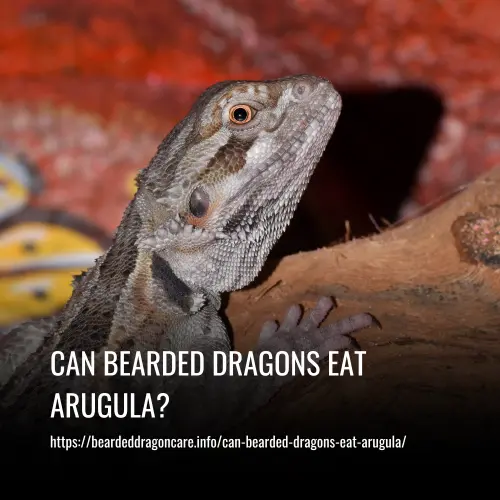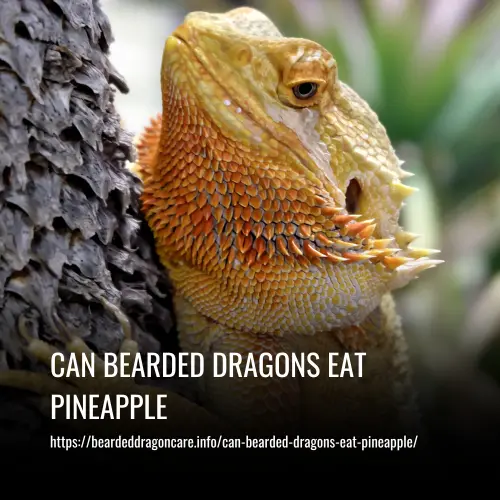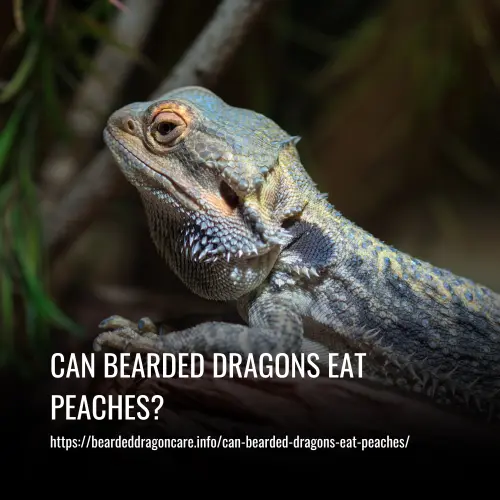Bearded dragons are reptiles native to Australia. They’re also known as dragon lizards because of their large head scales.
While most people would assume that bearded dragons cannot eat frogs, there are several species of bearded dragons that do just fine eating frogs. In fact, bearded dragons are often used as frog bait.
In this article, I’ll explain everything you need to know about if bearded dragons eat frogs.
Can A Bearded Dragon Eat A Frog?
Bearded dragons are carnivorous lizards that feed primarily on insects and small vertebrates. Some species of lizard, including bearded dragons, can consume large amounts of food. But, they usually prefer smaller meals.
Larger lizards tend to eat larger prey items. And, since bearded dragons are relatively small, they may need to grow larger before they can eat most of their prey.
So, how big does a bearded dragon need to be before he or she can eat a frog? Well, according to the University of Florida, a male bearded dragon needs to weigh between 1.5 and 2 pounds before he can start eating frogs. Females typically weigh less than males, so they might only need to reach half that weight.
But, keep in mind that the average adult bearded dragon weighs approximately 3 pounds. So, if you’re planning on giving your bearded dragon a frog, you should probably give him or her a little bit more room to grow.
Is frog safe for your bearded dragon?
Frogs are great for reptiles, especially bearded dragons. But if you’re planning on giving your bearded dragon a frog treat, you should know that it isn’t safe to give him a frog.
Bearded dragons need a light diet and something that will be easily digested. Crickets are a great option, but they shouldn’t be fed any bigger than the distance between your bearded dragon’s eyes. Feeding him anything larger than that could cause an obstruction in his digestive tract.
An impacted bowel can lead to death, so you need to be aware of how big your bearded dragon’s food needs to be before you start feeding him. And if he starts showing signs of discomfort after eating, stop immediately and consult your vet.
What are the risks of frogs for the bearded dragon?
Danger of choking
Bearded dragons are reptiles, so they can swallow pretty big stuff. However, they can choke on objects that exceed their digestive system capacity.
Choking is dangerous for bearded dragons because it can lead to death. If your pet is choking, you should immediately remove any object that may be causing the problem. Clean your pet’s throat using a syringe and water. Be careful not to force anything down your pet’s throat.
Your pet needs to be checked by a veterinarian if he/she is experiencing symptoms of choking.
Parasites and poisons
Frogs are known to carry parasites and diseases. You should never introduce any kind of frog to your bearded dragon. Even if you think the frog is healthy, there’s still a risk that it carries parasites or disease. And since you don’t know whether the frog has been eating poisonous plants, you might be exposing your bearded dragon to dangerous chemicals.
Wild frogs are notorious for carrying parasites and diseases. It’s impossible to know for sure whether a wild frog has been infected by parasites and disease. And since you don’t really know what the frog has consumed, you might expose your beardie to harmful chemicals.
So avoid introducing frogs to your bearded dragon. Instead, keep your bearded dragon safe by feeding him only natural foods.
Impaction risk
Frogs are known to cause impactions in reptiles, including bearded dragons. Impactions occur when food passes through the reptile’s digestive system without being broken down properly. As a result, pieces of undigested food block the intestines, causing the animal to experience abdominal pain.
Bearded dragons should eat foods that are small enough for them to digest. Insects are great for bearded dragons, but you should never feed them anything bigger than the distance between their eyes. Foods that are too big to move through the digestive system may cause impactions.
Excessive Vitamin A
Frogs are high in vitamin A, which is great for reptiles. But if you feed your bearded dragon frogs, you may end up causing problems for him.
Bearded dragons are omnivores, meaning they eat both plants and animals. And since they’re carnivorous, they require a lot of protein. However, they also need vitamin A to grow healthy skin and bones.
But if you give your bearded dragon frogs, he may become ill due to excessive amounts of vitamin A. You should only feed your bearded dragon frogs once per week, and never feed them live frogs. Instead, freeze them beforehand.
Toxin skin
Frogs secrete toxins through their skin. These toxins can cause serious health problems if ingested by reptiles. Some amphibians produce toxins that can kill reptiles.
Bearded dragons are vulnerable to the effects of frog toxins. Their small size makes them particularly susceptible to poisoning. Even though they may seem cute, bearded dragons should never be fed frogs.
To avoid any potential harm, keep your bearded dragon away from ponds where frogs live. You can also remove frogs from your yard using a net or vacuum cleaner.
What is the nutritional value of frogs for bearded dragons?
Frog legs, raw nutrition facts, and analysis per 1 leg (45 g)
Vitamins
Frogs are great sources of vitamins for bearded dragons. There are several types of vitamins that are important for your bearded dragon’s overall well-being. One of the most common vitamins found in frogs is vitamin A.
Bearded dragons require vitamin A to maintain healthy skin and eyesight. However, there are certain levels of vitamin A that should never be exceeded. Too much vitamin A can cause problems including liver disease, blindness, and death.
Carbohydrates
Frogs are high in protein, low in fat, and moderate in carbs. However, the carbohydrate content varies depending on how the frog was fed. Some frogs may only eat insects or worms, while others may eat fruits and vegetables.
Mineral
Frogs are high in calcium, phosphorus, magnesium, potassium, and iron. These minerals are important for healthy growth and development in reptiles. Frogs are also low in sodium, which means they won’t cause any problems if you feed them table salt.
Fats and fatty acids
Bearded dragons are reptiles, so they eat food that comes from plants. Their diet consists mostly of insects, worms, snails, slugs, spiders, small fish, and sometimes fruits and vegetables.
They also eat frogs. Frogs are high in protein and low in carbohydrates. And since they’re amphibians, they breathe through gills instead of lungs.
So, although they may seem strange, frogs are actually quite healthy for bearded dragons. They’re rich in varieties of fatty acids, which are not necessarily needed for the bearded dragon but help keep them safe from diseases caused by parasites.
Protein and amino acid
Frogs are a great source of protein for bearded dragons. They contain 7.38 grams of protein per serving. That means that 1/7th of a frog would give your bearded dragon enough protein to repair damaged tissue.
Bearded dragons should consume 80 percent protein during their early years. As they grow older, they should gradually decrease their consumption of protein until they reach adulthood.
Your bearded dragon needs to consume 3.5 grams of protein every day. You can find this amount in 1/7th of any kind of frog.
Reasons Why Bearded Dragons Can’t Feed On Frogs Or Toads
Bearded dragons are herbivores, meaning that they only eat plants. While they can eat insects, reptiles, fish, birds, mammals, and eggs, they won’t eat any animals that are bigger than themselves.
Bearded dragons can be affected by some parasites that wild toad and frog species might carry. These parasites include worms, ticks, mites, and fleas. They cannot eat amphibians because they cannot break down their skin and bone.
Many toad and frog species are larger than the bearded dragon can comfortably hold. For example, they just can’t eat large foods well, which might cause them to get stuck (impacted).
So if you’re thinking about giving your bearded dragon toads or frogs, make sure that they’re safe before doing so. You should keep them away from poisonous snakes and other reptiles. And make sure that they’re fed regularly and well-hydrated.
FAQs
Can a bearded dragon eat a frog when it’s wild?
They don’t need to eat frogs every day during the wintertime, but they do need to eat them occasionally. And even if the frogs are too big for the bearded dragon’s mouth, they’re not able to digest the frogs’ tough skins.
Can a bearded dragon eat a frog when it’s from a store?
You may wonder if buying live frogs from a pet shop would be safe for your bearded dragon. However, your bearded dragons still shouldn’t feed on any type of frog. Some things to consider when choosing which kind of frog to buy.
Can Bearded Dragons Eat Frozen Frogs?
It’s not good for them to eat frozen frogs that have been starved of their nutrients.
Can Bearded Dragons Eat Dead Frogs?
The answer is no. Frozen frog meat is not good for bearded dragons.
Can Bearded Dragons Eat Frogs from the Pond or Stream?
It is not worth the risk of feeding your bearded dragon a frog. There are several reasons why you shouldn’t ever give your bearded dragon a frog, including the fact that they may be carrying dangerous diseases.
Can Bearded Dragons Eat Green Tree Frogs?
Unfortunately, they’re not safe for bearded dragons and can cause serious health issues if ingested. They also can’t eat bone or skin because of how their mouth structures.
Can a bearded dragon eat a toad?
Because they’re both reptiles, the bearded dragon shouldn’t eat toads either. Furthermore, toads secrete liquid from their skins. This is deadly to bearded dragons and can poison them.
The difference between a toad and a frog is that a toad’s skins are bumpy. It is rougher and driers, which means that toads can blend in their surroundings more easily.
Could a bearded dragon live with a frog or toad?
It’d be better if frogs and toads aren’t put together with bearded dragons because they might eat each other. However, bearded dragons should’ t eat them either. They’re better off staying separate from each other.
Are frogs poisonous to Bearded Dragons?
Yes, because frogs excreted poison, and can even kill them.
Conclusion
Bearded dragons are carnivorous reptiles that feed primarily on insects and small lizards. They are known to eat frogs, however, and while this isn’t recommended, it’s not necessarily harmful either. In fact, bearded dragons are actually quite fond of eating frogs, and they often enjoy the taste.
So if you happen to catch a frog in your yard, feel free to offer it to your bearded dragon. It won’t hurt him, and he might even enjoy it.


